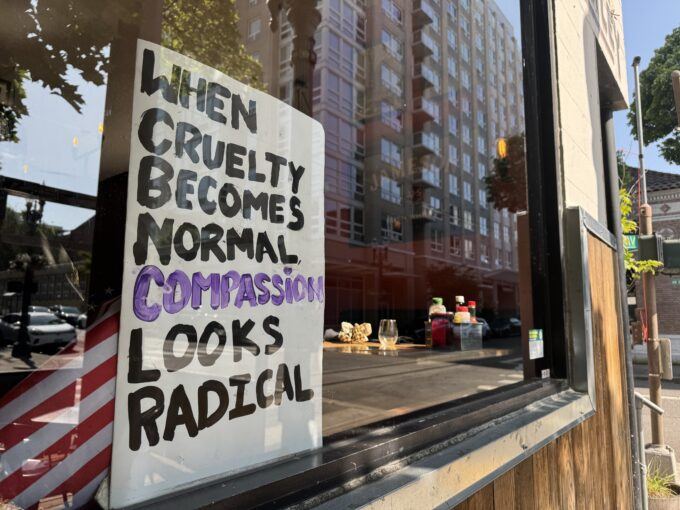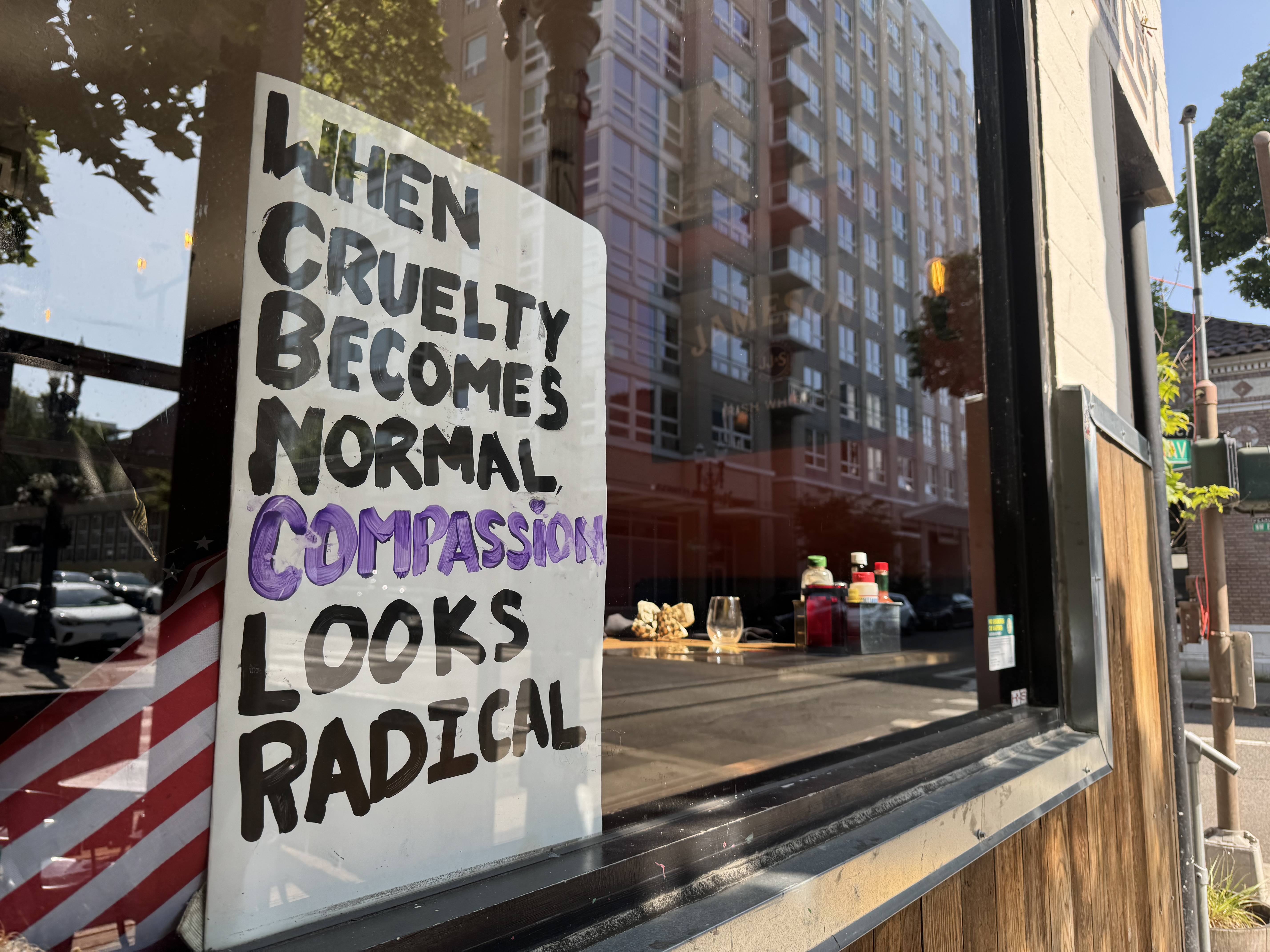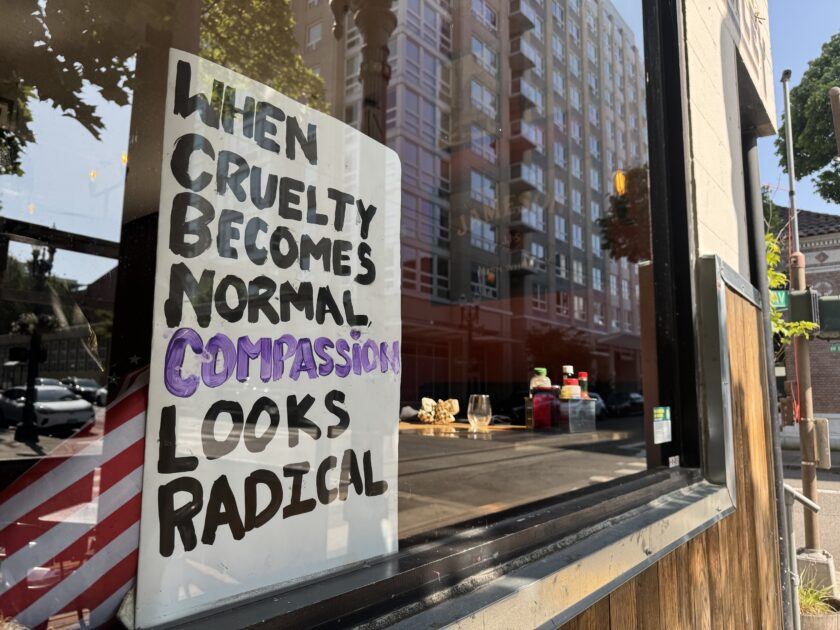


































































Photograph by Nathaniel St. Clair
There was a lot of wailing and gnashing of teeth when Trump did away with DEI initiatives. The sad truth, though, is that these initiatives were often nothing but window dressing. That is, many businesses and institutions used them as a form of PR. They’d point to their DEI policies as evidence that they cared about people, about doing the right thing, etc., etc., when, in fact, they couldn’t have been more indifferent to principles of justice and fairness. The same law firms, for example, that paraded the diversity of their associates before prospective clients, often did not have the same degree of diversity at the level of partner, and many had trouble getting people back to the office after remote work was no longer necessary. Lots of businesses had that problem, in fact, and one of the unstated reasons was that those offices were often incredibly unpleasant. Workplace bullying is out of control. People weren’t merely afraid of getting sick, they were afraid of being picked on.
Has there ever been a bigger civility deficit in our nation’s history? Possibly. I can’t say for sure because I’m not a historian. I can tell you, though, that there has never been a bigger civility deficit in my lifetime. It’s making people miserable. Human beings are mammals. Mammals are social animals. They are basically caring and nurturing. Neurologists tell us that we have “mirror neurons” that are the foundation, or at least part of the foundation of empathy. They cause us to suffer when we see others suffering.
There’s a lot of suffering going on in a lot of workplaces. The suffering isn’t restricted to workplaces, though. People are being beaten up on rhetorically on social media, and even in the mainstream media. Bullying has become socially acceptable. And it isn’t just the people who are being beaten up on who are miserable, either. Those pesky mirror neurons mean that nearly everyone who is relentlessly bombarded with the spectacle of other people being bullied is made miserable by it.
Is it any wonder that so many people are on anti-depressants?
I don’t know how it all started, but I can give you my theory. I think it started with Milton Freedman effectively telling everyone that greed was good, and with the gradual dismantling of the regulatory agencies that began under Reagan and that has continued pretty much unabated ever since, independently of who occupied the Oval Office. A blind eye was increasingly turned on white-collar crime (see Jed S. Rakoff’s “Getting Away with Murder,” New York Review of Books, Dec. 3, 2020 and The Criminal Elite: Understanding White Collar Crime) until, finally, it was no longer considered safe to conduct business ethically. People felt compelled to find ways around the laws for fear that if they didn’t, they’d be out competed by others with fewer scruples. Even mammals will turn on one another if they feel their very survival is at stake.
And while all this was going on, wealth was becoming increasingly polarized. Everyone but those at the very top of the socio-economic scale became increasingly economically vulnerable. This is an expression of the “economic bullying” Rob Reich talked about recently in a New York Times interview.
We took civilization and reversed engineered it. We are effectively back to Hobbes’ “state of nature” where life is “solitary, poor, nasty, brutish and short.” I’ll leave aside the issues of how our lives are increasingly solitary, how parents don’t even have enough time to spend with their children, let alone their friends. I’ll leave aside as well the issue of how we have one of the shortest life expectancies in the economically developed world. What I want to focus on is the nastiness and brutishness of contemporary American culture.
Bullying became normalized. Contrary to the infamous “separatist thesis” that is speciously attributed to Michel de Montaigne in order to give intellectual credibility to the blatantly untenable thesis that it is possible to have two separate sets of ethics: one for work and another very different one for life outside work, bullying spread from professional contexts to personal ones and trickled down from the highest levels of society to the lowest ones. Not only has it become socially acceptable to excoriate someone at work for what is perceived to be their poor performance, it has become socially acceptable to excoriate friends and relatives for what is perceived to be their dangerously misguided political views.
It hasn’t always been that way. I remember when times were better, a lot better. I remember when people who were properly brought up (and by that I mean not raised by wolves) treated one another, including those with whom they disagreed on political issues, civilly. That didn’t happen by accident, though. It was to some extent merely an expression of mammalian nature, of our natural desire to get along with one another. It was helped along, though, quite self consciously, by people in positions of authority. I was surprised a few years ago when I discovered a bunch of old public-service short films on YouTube. They were made during the period just after WWII. Check out “How Honest Are You?” from 1950. It’s a great little short film on the problem of non-moral motives entering into the determination of a person’s actions. Then there is “Am I Trustworthy?” also from 1950. There’s “Mind Your Manners,” from 1953, “Marriage is a Partnership,” from 1951, and “Family Life,” from 1949. There are lots and lots of these videos, all clearly designed not merely to encourage the creation of harmonious communities but also happy individuals.
My guess is that the motivation for these films was the horror of WWII, the forced confrontation with just how frighteningly wrong human beings can go if societies abdicate their responsibility for instilling, or at least enforcing, in people the proper moral values. Aristotle argued persuasively, in the first book of the Nicomachean Ethics, that “the main concern of politics is to engender a certain character in the citizens and to make them good and disposed to perform noble actions.” He appreciated, of course, that “to be a competent student of what is right and just, … one must first have received a proper upbringing in moral conduct,” but he understood as well how profoundly social human beings are and how it was thus necessary for governments to reinforce the moral training its citizens received in their youth.
Aristotle understood that even if a person were raised to be kind and honest, etc., but was then thrust as an adult into world where kindness and honesty were treated with contempt, it wouldn’t take long before they wouldn’t be so kind or honest anymore. People naturally conform to their environment. I’m generalizing, of course. There will always be those exceptional individuals who will stick to the values they were raised to believe were right independently of cultural influences or social pressures. Those people are exceptional, though. Most people aren’t exceptional. Most people are average. And, on average, people are conformist. That, sadly, is part of mammalian nature as well.
That’s why civilization is so precious. People often think that moral progress, like technological progress, is inevitable. It isn’t, though. It’s extremely fragile. The slightest threat can unravel it and when it starts to unravel, laws are more or less impotent to stop it. Plato pointed out in Book IV of the Republic that properly functioning societies don’t need many laws. The legislation of morality has been increasingly popular precisely because our society is unraveling. We’ve become Plato’s caricature of a dysfunctional society, “continually setting down many rules” in the hope that in that way we’ll “get ahold of what’s best.” And yet these efforts are doomed to fail because even the best laws are useless if those with the authority to enforce them are contemptuous of the values they represent.
G.K. Chesterton pointed out way back at the beginning of the last century that “we do not get good laws to restrain bad people. We get good people to restrain bad laws.”
What we need is not more laws. What we need is more good people. Alasdair MacIntyre argued in After Virtue, that moral theorizing basically took a wrong turn in the Enlightenment when it shifted its focus from the formation of good character to the determination of authoritative moral rules. I used to think he was wrong. I’ve changed my mind.
The post Back to Virtue appeared first on CounterPunch.org.
This content originally appeared on CounterPunch.org and was authored by M. G. Piety.